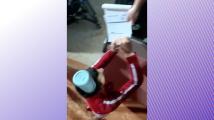The Rush: Bryson DeChambeau on golf science, fans at Augusta and proving the haters wrong
Golfer Bryson DeChambeau joins Jared to chat about his scientific approach to the game, his diet and exercise routine in quarantine, the return of fans to Augusta National in 2021 despite the COVID-19 pandemic, and how winning the 2020 U.S. Open was sweet vindication from a lifetime of haters. PLUS: Jared plays professor with a pop quiz for “The Scientist.”
Video Transcript
- You're also known for your unique style on the course. I mean, you use clubs that you personally engineered, and you bring a protractor on the putting green. Where did you get this unique approach from?
BRYSON DECHAMBEAU: Well, it's always trying to find a distinct advantage, and no matter what in life, I'm always trying to be ahead of the game. Whether it's having a protractor or mechanical compass, or you know, trying to use a longer driver, or building one legged irons and trying to be as consistent as possible. I'm always trying to find a distinctive advantage that allows me to be better than the next player.
JARED QUAY: What's up, everybody. I'm here with 2020 US Open champion Bryson DeChambeau. Bryson, how you doing today, brother?
BRYSON DECHAMBEAU: Good, Jared. How you doing, my man?
JARED QUAY: You're having quite a bit of a different quarantine than the rest of us. We're all sitting around gaining weight, and somehow you got yoked during this time. How has bulking up helped your golf game?
BRYSON DECHAMBEAU: I was fortunate enough to have a gym at my home during all of quarantine. And every day, I just started working out. I said you know what, I'm going to make a change in my life, hopefully inspire a few people to go work out and better their lifestyles as well. And come out shaking some things up in the golf world, and that's what I was fortunately able to do.
JARED QUAY: Looks good, man. But what the funnest part of it is, I heard that you're eating 3,500 calories a day. I dream of eating that much, but like, what's your favorite part of that? Is there like a favorite food that's healthy and a lot of calories, or what?
BRYSON DECHAMBEAU: I would say steak and potatoes is my go-to. I absolutely love it. I can't get enough of it.
JARED QUAY: Whatever you're doing, it's working, because in September, you captured your first career major championship at the US Open. Like, tell me, describe, I want to feel how you felt. How did that feel?
BRYSON DECHAMBEAU: A lot of emotion. A lot of joy, a lot of-- I guess it was vindication. And satisfaction of accomplishing something that you've dreamed of your whole life. I mean, I remember growing up and having a putt to win the US Open. And I wouldn't leave 'til I redid the scenario in my head of me actually making that putt.
And what's funny about it is, I went on the 18th hole, even though I a six-shot-- or no, five-shot lead at the time. A six-shot lead at the time. I said to myself, I've got to make this putt. This is what it was all about. And I was able to make it, on top of winning by six. It was just a really cool moment that will last for me for the rest of my life.
JARED QUAY: One of the words you used there was "vindicated." Like, who did you feel vindicated from?
BRYSON DECHAMBEAU: Well, it was more that I was so unique growing up that-- and I was kind of resistant to the norm, that everybody thought I was different or weird or unique, and didn't believe that I was going to have any success growing up. I mean, I remember having high school coaches not believe in what I was doing, and think that there's no way he's going to be successful at all, swinging the way he is, doing the things he's doing. There's just no way.
And so a lot of it was with that. And then in college, I had resistance, and then even in professional golf, I had resistance. So at every stage, I've always had resistance, quite a bit of resistance, that you know, has allowed me to look forward and use that as fuel to fuel my fire and ignite me to do some really amazing things. And fortunately I was able to do that. And now I feel like I'm set free. I can go do whatever and be OK with it, because you know, I proved myself a little bit now, which is great.
JARED QUAY: Yeah, now that you've proved it worked, there's gonna be a bunch of kids out there, swinging all unorthodox, having a good time!
BRYSON DECHAMBEAU: Doing it their own way. Like Arnie said, swing your own swing.
JARED QUAY: Augusta National recently announced that it has planned to let a limited attendance at this year's Masters amidst the pandemic. Is this a good idea, bad idea? How do you feel?
BRYSON DECHAMBEAU: As long as we are taking caution, socially distancing, wearing masks, and they're preparing themselves to be in an environment like this, I think it's a great thing. You know, from a golfer's perspective, we love having fans. We think it's an amazing aspect of the game that sometimes spur us on in a positive way.
JARED QUAY: The few that are there need to be loud after you hit that, like--
BRYSON DECHAMBEAU: Yeah.
JARED QUAY: 'Cause you need 'em.
BRYSON DECHAMBEAU: To make up for the other fans that aren't there.
JARED QUAY: Your nickname is "The Scientist."
BRYSON DECHAMBEAU: Bridgestone added surfactant, which is a compatibility agent, so the active acceleration mantle can increase thrust.
JARED QUAY: And so right now, we're going to put that tool to work right now. Because I'm going to give you a pop quiz, hotshot! Here we go!
BRYSON DECHAMBEAU: Uh-oh!
JARED QUAY: How many digits in the number pi can you recite from memory?
BRYSON DECHAMBEAU: Oh my gosh. I haven't studied it, but just 3.141296. I think it's, like, something, like-- oh, I don't know. I think that's all I got.
JARED QUAY: Finish the phrase. E equals MC--
BRYSON DECHAMBEAU: Squared.
JARED QUAY: Boom, there we go! You are a scientist.
BRYSON DECHAMBEAU: Pretty easy.
JARED QUAY: How many different kinds of triangles are there?
BRYSON DECHAMBEAU: Triangles? Equilateral, isosceles. Man, that's geometry. That was 10th grade, dude. You're killing me. Let's go, let's go five.
JARED QUAY: Well, here we go. What does a flux capacitor do?
BRYSON DECHAMBEAU: Oh, flux capacitor. So that's-- geez. That's from "Back to the Future." I don't even think that's actually invented. But it's a time traveling machine. It's a time traveling machine.
JARED QUAY: This is what makes time travel possible.
BRYSON DECHAMBEAU: I can see why the call you "The Scientist." That's better than 97% of people would do.
JARED QUAY: Thanks. Appreciated that.
BRYSON DECHAMBEAU: Thanks for taking the time to rush with me today. Stay jacked, stay safe, and we wish you all the luck out there on the course, OK?
JARED QUAY: Thank you. Appreciate it, Jared.







